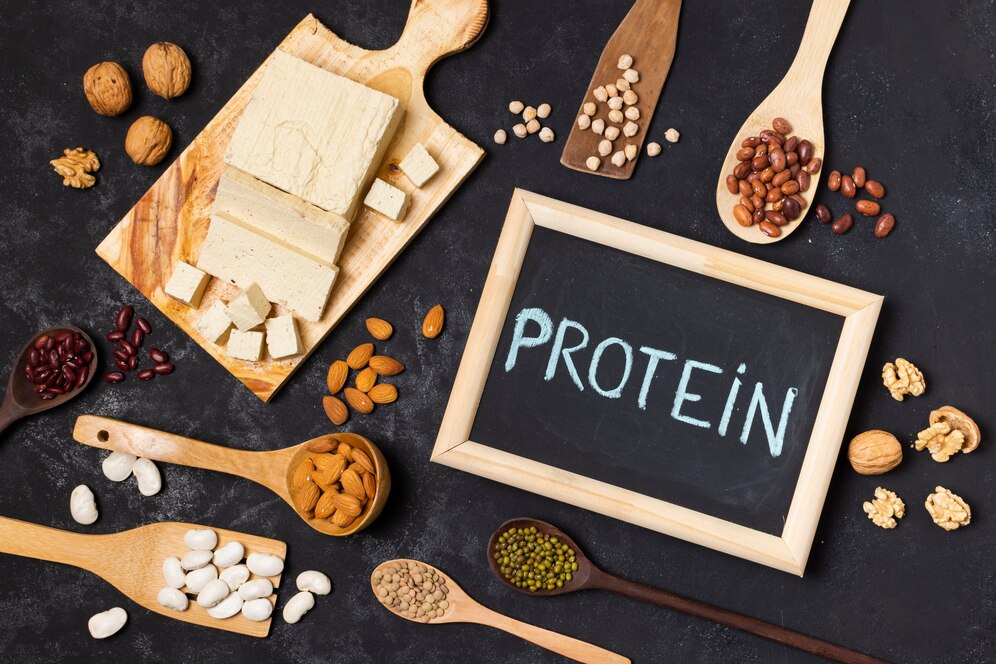
Protein & Fibers Required At The Time Of Menopause
Living without fats isn’t an option.
Menopause, which occurs after a woman has gone 12 months without a menstrual period, is +a natural stage of life that everyone who menstruates will experience. The body’s numerous changes create symptoms that can begin before menopause (perimenopause) and linger for a while.
Menopause symptoms don’t have to lower your quality of life, even though they are unavoidable. During this time, diet can play a significant role in reducing symptoms and restoring your sense of self. The majority of women going through menopause are losing muscle mass and have slower metabolisms. The number of calories required by women going through menopause is lower than it was in their earlier years. For women of that age, portion restriction is the best option overall.
Although eating fewer calories may be necessary, you still need to make sure your diet is enough in vitamins and nutrients to help ward off diseases like osteoporosis and heart disease. Finding meals high in nutrients is, therefore, more crucial than ever. To make sure you’re getting the vitamins and minerals your body needs, you might also need to discuss taking dietary supplements with your doctor or a registered dietitian nutritionist.
Here, we will briefly discuss how protein and fiber help during menopause and how much you should consume. So, get ready.
Menopause: What Is It?
Before we dive any deeper into the topic, first take a quick look at the basics of menopause.
Menopause is the state in which an individual has not had a menstrual cycle for an entire year due to very low estrogen production from the ovaries. A person who is menstruating will go through perimenopause in the years before menopause, which typically starts in the late 30s and early 40s. The ovaries’ varying production of estrogen throughout the perimenopause might lead to irregular menstruation periods. Seeking medical attention is crucial if you’re having excessive or persistent bleeding, bleeding between periods, or worsening cramps.
Symptoms –
Many hormonal changes occur in the body as the perimenopause gives way to menopause. The following symptoms may result from these changes:
- Changes in the menstrual cycle
- Vasomotor symptoms, such as nocturnal sweats and hot flushes
- Difficulty falling asleep
- Weary
- Memory issues
- Mood swings
- Variations in weight and a slower metabolism
- Reduced density of bone
- Urinary tract infections caused by dry vagina
What Diet Foods Are Appropriate for Menopause?
Your nutrition greatly influences your total health. Eating habits can have an impact on mood during perimenopause, menopause, and post-menopause. During this transition, symptoms may be lessened by including foods high in proteins and fibers, along with carbs, calcium, vitamin K, and vitamin D.
Why Protein is Important During Menopause
Protein is an essential component that our bodies employ to create new cells and repair broken ones. Several hormones, such as those that regulate and maintain the thyroid gland and our digestive systems, also contain protein. FSH (follicle stimulating hormones), which are crucial for ovarian function, and insulin are examples of protein or peptide hormones. Red blood cells include a protein called hemoglobin, which helps the body carry oxygen to our cells and get rid of carbon dioxide waste. This nutrient is also essential for our bones. As protein promotes bone remodeling, which is the process by which bone replaces itself by regenerating new tissue and breaking down old tissue, our bodies’ bones remain strong.
Dietary proteins, along with calcium, vitamin D and K2, are essential for maintaining bone health and may help lower the risk of osteoporosis, which is more common in women going through menopause. Although adequate protein consumption in postmenopausal women has been shown in several studies to increase bone density and general bone health, it is not recommended as a preventative or therapy measure for osteoporosis.
How Much Protein Is Appropriate for Menopause Diet?
It’s common for women going through menopause to attempt cutting back on their daily caloric intake in an effort to prevent weight gain. However, eliminating protein as part of that plan may actually raise the chance of muscle loss, which will unavoidably worsen balance and mobility. In fact, a combination of increased protein intake and general calorie reduction assisted women in maintaining an acceptable amount of muscle mass relative to pounds lost. When compared to healthy women who consume less protein, postmenopausal women who eat more protein also typically see gains in their cardiovascular health.
Nutritionists agree on two points regarding the significance of protein consumption for aging adults: a woman can protect her muscles by stimulating the production of muscle protein by consuming 25 to 30 grams of protein at each major meal, and she can enhance the ability of the protein to build muscle by exercising before or after meals. That means you can maintain your muscle tone and strength well into menopause and beyond by making sure your regular diet includes adequate protein and by continuing to be physically active.
How to Add Protein to Your Diet
There are a few resources and easy suggestions that can help you if you’re having trouble figuring out how to increase your protein intake during menopause.
In order to make sure you’re receiving enough protein each day, think about eating your protein source first. This will help you feel fuller, which will help you stick to your weight control objectives throughout menopause. A few studies have indicated that eating eggs for breakfast will help you feel satiated for longer, so think about replacing your cereal in the morning. Last but not least, consider reaching for protein-rich but low-calorie snacks like edamame, cottage cheese, lean jerky, or almonds. These are excellent choices for women going through menopause.
How Fiber Helps Keep Menopausal Women Healthy
Fiber isn’t glamorous. Unlike protein, fat, or carbohydrates, it doesn’t always draw attention or clicks. However, this is the one aspect of your diet that you should really be monitoring if you’re a woman going through menopause or older.
Our pelvic floor health is one of the main reasons fiber is so important throughout this stage of life. About 50% of women experience pelvic organ prolapse, which is the dropping of organs such as the uterus, bladder, or rectum from their normal position into or out of the vagina. The risk is increased during menopause. Constipation is one of the factors.
Here are some reasons to start eating more fiber every day.
Improves nutrient absorption –
A lot of nutrients are necessary for your body to function. Your body can absorb such nutrients from food sources more effectively if you consume dietary fiber. In the stomach, soluble fibers break down and transform into a gelatinous substance. This slows down digestion, enabling gut bacteria to more effectively absorb nutrients that can cross the intestinal membrane and enter the bloodstream.
You need every vitamin you can obtain throughout menopause to maintain good health because you are more susceptible to age-related illnesses. What then benefits the body from fiber? As you age, dietary fiber, for instance, can help your body retain muscle and bone density by assisting in the extraction of vitamins and minerals from your food sources to produce new cells.
Protects your heart –
Traditional heart disease risk factors, such as excessive cholesterol levels, can be exacerbated by menopause. Increasing your fiber intake can lower your cholesterol.
Helps with blood sugar management –
Our cells may grow less sensitive to insulin when our sex hormone levels drop, making it more difficult to control blood sugar. Furthermore, contributing to glucose spikes and crashes during perimenopause are hormonal variations. Fiber keeps your blood sugar constant and helps lessen surges.
How to Add Fiber to Your Diet
The simplest method to receive tons of vitamins, minerals, and phytonutrients and increase your consumption of fiber is to eat more plant foods including fruits, vegetables, nuts, roots, shoots, and whole grains.
Foods to Avoid At The Time Of Menopause
Restricting specific foods may help lessen hot flashes, weight gain, and sleep issues, among other menopausal symptoms.
The following are some crucial foods and beverages to avoid:
- Fried meals, sweets, and potato chips are examples of highly processed foods.
- Foods and beverages, including soda, energy drinks, and baked products that have added sugar
- Meals, including soups, deli meats, and pretzels that are heavy in salt and caffeine
The bottom line
A slower metabolism, less bone density, and an elevated risk of heart disease are all associated with menopause.
In addition, a lot of women go through uncomfortable menopause symptoms like hot flashes and insomnia.
Eating a whole-food diet high in fruits, vegetables, whole grains, dairy products, and high-quality protein may help reduce the symptoms of menopause. It might also be beneficial to consume phytoestrogens and good fats, including omega-3 fatty acids from fish.
Limiting your intake of processed meals heavy in carbohydrates, added sugars, alcohol, caffeine, and sodium may also be a good idea. These dietary adjustments may help you through this significant life shift more easily.









